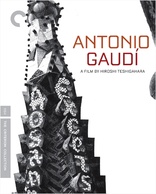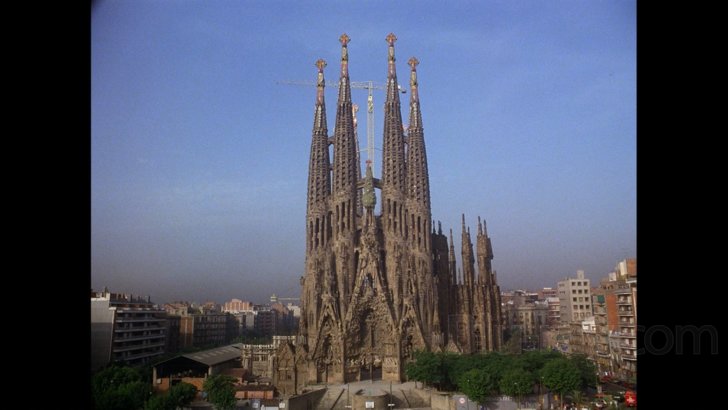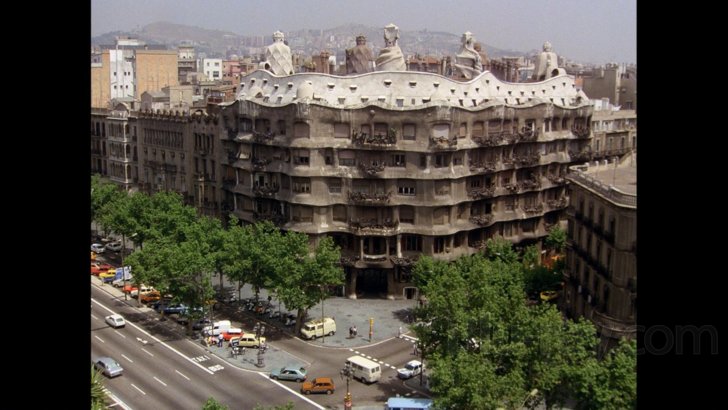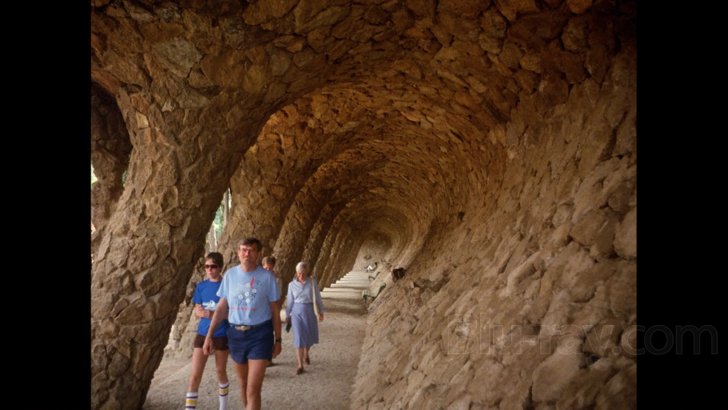Antonio Gaudí Blu-ray Movie
HomeAntonio Gaudí Blu-ray Movie 
Criterion | 1984 | 72 min | Not rated | Feb 18, 2020
Movie rating
7.2 | / 10 |
Blu-ray rating
| Users | 0.0 | |
| Reviewer | 4.0 | |
| Overall | 4.0 |
Overview
Antonio Gaudí (1984)
The work of Catalan architect Antonio Gaudí, as seen by Japanese New Wave director Hiroshi Teshigahara.
Director: Hiroshi Teshigahara| Foreign | Uncertain |
| Documentary | Uncertain |
Specifications
Video
Video codec: MPEG-4 AVC
Video resolution: 1080p
Aspect ratio: 1.33:1
Original aspect ratio: 1.37:1
Audio
Japanese: LPCM Mono (48kHz, 24-bit)
Subtitles
English
Discs
Blu-ray Disc
Single disc (1 BD)
Playback
Region A (locked)
Review
Rating summary
| Movie | 4.0 | |
| Video | 4.5 | |
| Audio | 5.0 | |
| Extras | 4.0 | |
| Overall | 4.0 |
Antonio Gaudí Blu-ray Movie Review
Reviewed by Dr. Svet Atanasov March 5, 2020Hiroshi Teshigahara's "Antonio Gaudí" (1984) arrives on Blu-ray courtesy of Criterion. The supplemental features on the disc include archival documentary program by Ken Russell; archival interview with architect Arata Isozaki; additional documentary material; and more. The release also arrives with a 38-page illustrated booklet featuring writings on the film and technical credits. In Japanese, with optional English subtitles for the main feature. Region-A "locked".

Who is Antonio Gaudi? A visionary Catalan architect who was born in 1852 and died in 1926, leaving behind a rather extraordinary legacy which is now synonymous with Catalan identity. In Barcelona, Gaudi’s Casa Mila (La Pedrera) for instance is a cultural landmark and an unmissable tourist attraction, while his masterpiece, La Sagrada Familia, which is set to be completed by the year 2026, is likely to emerge as one of Europe’s biggest architectural jewels.
Hiroshi Teshigahara’s film is a cinematic exploration of Gaudi’s legacy which does not follow the rules conventional documentaries do. What does this mean exactly? Well, the film is essentially dialog-free and does not employ the services of experts and historians to explain Gaudi’s genius. Instead, it roams free and simply marvels the unusual forms, colors and textures of different buildings and objects that Gaudi worked on. As such it can look and feel quite casual, occasionally perhaps even oddly unfocused, but it helps the viewer form an intimate relationship with a wide range of places, structures, and objects that leaves a lasting impression.
The absence of factual information or even basic identifications, however, could make it very difficult for a viewer to grasp the cultural significance of Gaudi’s legacy. Indeed, there is a lot to marvel, but after a while it becomes quite clear that certain buildings and structures are representative of different phases of Gaudi’s career which would have been better appreciated and understood if they were identified and placed in a proper historical context.
From time to time the camera effectively takes a break from marveling Gaudi’s legacy, but this is when some of the most intriguing material emerges. Here the viewer gets a real sense of how Gaudi's masterpieces actually fit in the lives of ordinary folks and how both coexist in harmony. (The relationship is very difficult to accurately describe with simple words and perhaps makes sense only when witnessed, but it is essentially a reflection of very close and practical union between traditionalism and modernism).
Teshigahara’s film has some rather interesting similarities with Tokyo-Ga, which Wim Wenders completed a year after it. Much like Teshigahara, Wenders brushes documentary rules aside and enters the Japanese capital with the unbridled curiosity of a foreign tourist ready to be mesmerized. Of course, Wenders was on a mission to accomplish something entirely different -- which is rediscover the city Yasujiro Ozu had immortalized in his films and he had come to admire -- but this is the reason why Tokyo-Ga is just as fluid and often as poetic as Teshigahara’s film.
Legendary Japanese composer and music theorist Toru Takemitsu (Ran, Kwaidan), Shinji Hori, and Kurodo Mori created the atmospheric soundtrack for the film.
Antonio Gaudí Blu-ray Movie, Video Quality 

Presented in an aspect ratio of 1.33:1, encoded with MPEG-4 AVC and granted a 1080p transfer, Antonio Gaudi arrives on Blu-ray courtesy of Criterion.
The following text appears inside the booklet that is provided with this Blu-ray release:
"This high-definition digital transfer was created on a Spirit DataCine film scanner from a 35mm low-contrast print struck from the original camera negative. Thousands of instances of dirt, debris, scratches, splices, and warps were manually removed using MTI Film's DRS. The soundtrack was remastered from an original soundtrack print using Avid's Pro Tools and iZotope RX.
Transfer supervisor: Lee Kline.
Colorist: Joe Gawler/Technicolor, New York."
Excluding a few areas where some of the darker material could and should have slightly better defined nuances as well as a few highlights that could be better balanced, the film looks very healthy and attractive. In fact, for a documentary the overall composition of the visual material is uncharacteristically good, which means that you should not expect to see abrupt fluctuations in terms of density and dynamic range. (The raw material is managed and edited very well). The color balance is very convincing as well. There are no traces of problematic digital work/adjustments. Image stability is excellent. Lastly, there are no scratches, cuts, damage marks, warped or torn frames to report in out our review. (Note: This is a Region-A "locked" Blu-ray release. Therefore, you must have a native Region-A or Region-Free player in order to access its content).
Antonio Gaudí Blu-ray Movie, Audio Quality 

There is only one standard audio track on this Blu-ray release: Japanese: LPCM Mono (with a few lines in Spanish). Optional English subtitles are provided for the main feature.
There are only a couple of exchanges in the entire film, so the soundtrack basically mixes a wide variety of organic sounds and noises, with the original music themes adding a bit of flavor in the background. Predictably, the dynamic contrasts are unimpressive, but this is how the soundtrack was created. There are no audio dropouts or digital distortions to report.
Antonio Gaudí Blu-ray Movie, Special Features and Extras 

- Trailer - an original trailer for Antonio Gaudi. With music. (2 min, 1080p).
- Gaudi, Catalunya, 1959 - presented here is a 16mm footage which Hiroshi Teshigahara shot while visiting Barcelona and the Catalonian countryside with his father in 1959. Silent. (20 min, 1080i).
- Arata Isozaki - in this archival interview, architect Arata Isozaki discusses his friendship with Hiroshi Teshigahara, his fascination with Antonio Gaudi, and some of the socio-political ideas that influenced the evolution of his work. The interview was conducted exclusively for Criterion in 2006. In Japanese, with optional English subtitles. (14 min, 1080i).
- God's Architect: Antonio Gaudi - presented here is a segment of the BBC architecture series Visions of Space in which critic Robert Hughes discusses the creative style of Antonio Gaudi, with a special emphasis on the importance of religion in it and relationship with the city of Barcelona. The program was produced in 2003. In English, not subtitled. (60 min, 1080i).
- Monitor - this documentary program, directed by Ken Russell (The Devils), examines Antonio Gaudi's architectural legacy. In English, not subtitled. (16 min, 1080p).
- Sculptures by Sofu-Vita - presented here is a short film that Hiroshi Teshigahara completed in 1963. It documents the installation of an exhibition of sculptures by his father, Sofu Teshigahara, at the Sogestsu Art Center in Tokyo. In Japanese, with optional English subtitles. (18 min, 1080p).
- Booklet - 38-page illustrated booklet featuring an essay by art historian Dore Ashton, a 1986 reminiscence by Hiroshi Teshigahara, and excerpts from a 1959 conversation among the Teshigaharas and others about their trip to the West.
Antonio Gaudí Blu-ray Movie, Overall Score and Recommendation 

Hiroshi Teshigahara's film certainly can inspire one to begin researching Antonio Gaudi's work, but to grasp its magnitude and cultural significance one would have to plan a trip to Barcelona and spend some time there observing it. I think that it is unique and engaging, quite beautifully shot as well, but at best it is only a teaser. Criterion's release of Antonio Gaudi is sourced from an older yet very solid master, and comes with a pretty good selection of archival bonus features. HIGHLY RECOMMENDED.
Similar titles
Similar titles you might also like

Twenty Years Later
Cabra Marcado para Morrer / A Man Marked for Death
1984

Man with a Movie Camera
Человек с киноаппаратом / Chelovek s kino-apparatom
1929

Agnčs de ci de lŕ Varda
Agnčs Varda: From Here to There
2011

The World of Jacques Demy
L'univers de Jacques Demy
1995

The Gleaners and I: Two Years Later
Les glaneurs et la glaneuse... deux ans aprčs
2002

Daguerréotypes
1976

Faces Places
Visages villages
2017

The Gleaners and I
Les glaneurs et la glaneuse
2000

Psychomagic, A Healing Art
Psychomagie, un art pour guérir
2019

Henri-Georges Clouzot's Inferno
L'Enfer d'Henri-Georges Clouzot
2009

Keep Rolling
好好拍電影
2020

As Time Goes By
去日苦多
1997

The Dark Glow of the Mountains
1985

America as Seen by a Frenchman
L' Amérique insolite
1960

Fĺrö Document
Fĺrödokument
1970

My Journey Through French Cinema
Voyage ŕ travers le cinéma français
2016

Fĺrö Document 1979
Fĺrödokument 1979
1979

Love Meetings
Comizi d'amore
1964

Herdsmen of the Sun
1989

Chronicle of a Summer
Chronique d'un été
1961